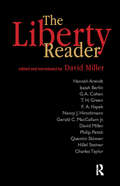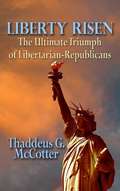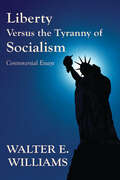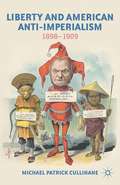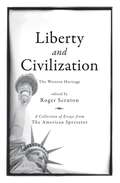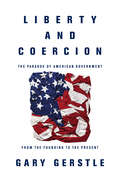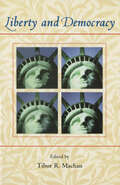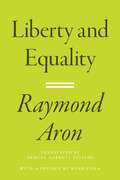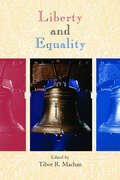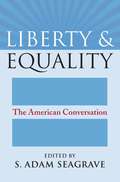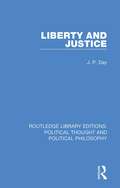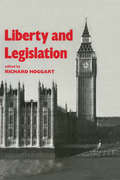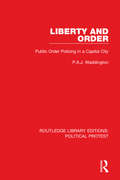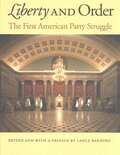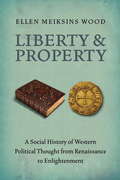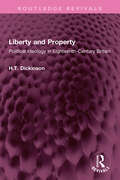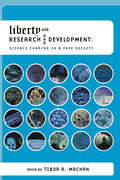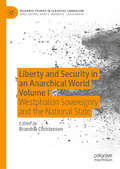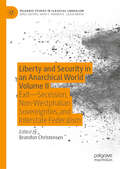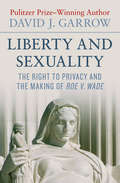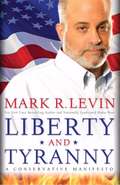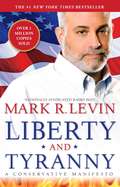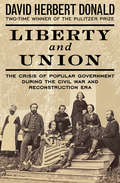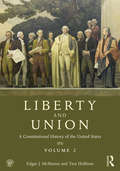- Table View
- List View
Liberty Reader (Edinburgh University Press Series)
by David MillerFor centuries past, the quest for liberty has driven political movements across the globe, inspiring revolutions in America, France, China and many other countries. Now, we have Iraq and the idea of liberation through preemption. What is this liberty that is so fervently pursued? Does it mean a private space for individuals, the capacity for free and rational choice, or collective self-rule? What is the difference between positive and negative liberty, or the relationship between freedom and coercion? Reflecting on these questions reveals a surprisingly rich landscape of ideas - and further questions. "The Liberty Reader" collects twelve of the most important and insightful essays on issues of freedom currently available. It is essential reading for students of social and political theory, political philosophy, and anyone who wants a deeper understanding of the variety of ideas and ideals behind perennial human strivings for liberty.
Liberty Risen: The Ultimate Triumph of Libertarian-Republicans
by Thaddeus MccotterIn this Internet Age, is the Grand Old Party over for the Republican Establishment? If so, what individuals and ideas will ascend to meet the moment and revitalize a party that is now viewed as more of an antiquated complaint than a transcendent cause? In "Liberty Risen: The Ultimate Triumph of Libertarian-Republicans", former GOP House Republican Policy Chair - and NOT a Libertarian - Thaddeus McCotter articulates the political and cultural circumstances driving the GOP's once disdained Libertarian wing to its present prominence and predestined dominance. Yet, if Liberty is risen, when will it reign? To find out, buy the book.
Liberty Versus the Tyranny of Socialism: Controversial Essays
by Walter E. WilliamsIn this selected collection of his syndicated newspaper columns, Walter Williams offers his sometimes controversial views on education, health, the environment, government, law and society, race, and a range of other topics. Although many of these essays focus on the growth of government and our loss of liberty, many others demonstrate how the tools of freemarket economics can be used to improve our lives in ways ordinary people can understand.
Liberty and American Anti-Imperialism: 1898-1909
by Michael Patrick CullinaneThis book provides a study of the American anti-imperialist movement during its most active years of opposition to US foreign policy, from 1898 to 1909. It re-evaluates the movement's motives and operations throughout these years by evaluating the way in which Americans conceived the idea of 'liberty. '
Liberty and Civilization
by Roger ScrutonAn essential volume of essays commissioned by the American Spectator and edited by the philosopher Roger Scruton, Liberty and Civilization examines the intellectual and spiritual traditions of our belief in individual liberty, from its Judeo Christian origins on through Enlightenment philosophy. As we are confronted by belligerent atheism at home and jihadist Islam abroad, Liberty and Civilization is an invaluable tool for understanding why it is critical that we defend the cultural, religious, and intellectual institutions that have made our civilization great.As one would expect from the American Spectator, the responses are both fiery and edifying, representing a broad swath of American conservative thought. The essayists include Paul Johnson, Anne Applebaum, Robert Bork, Robert P. George, Christina Hoff Sommers, and Roger Scruton.
Liberty and Coercion
by Gary GerstleAmerican governance is burdened by a paradox. On the one hand, Americans don't want "big government" meddling in their lives; on the other hand, they have repeatedly enlisted governmental help to impose their views regarding marriage, abortion, religion, and schooling on their neighbors. These contradictory stances on the role of public power have paralyzed policymaking and generated rancorous disputes about government's legitimate scope. How did we reach this political impasse? Historian Gary Gerstle, looking at two hundred years of U.S. history, argues that the roots of the current crisis lie in two contrasting theories of power that the Framers inscribed in the Constitution. One theory shaped the federal government, setting limits on its power in order to protect personal liberty. Another theory molded the states, authorizing them to go to extraordinary lengths, even to the point of violating individual rights, to advance the "good and welfare of the commonwealth." The Framers believed these theories could coexist comfortably, but conflict between the two has largely defined American history. Gerstle shows how national political leaders improvised brilliantly to stretch the power of the federal government beyond where it was meant to go--but at the cost of giving private interests and state governments too much sway over public policy. The states could be innovative, too. More impressive was their staying power. Only in the 1960s did the federal government, impelled by the Cold War and civil rights movement, definitively assert its primacy. But as the power of the central state expanded, its constitutional authority did not keep pace. Conservatives rebelled, making the battle over government's proper dominion the defining issue of our time. From the Revolution to the Tea Party, and the Bill of Rights to the national security state, Liberty and Coercion is a revelatory account of the making and unmaking of government in America.
Liberty and Democracy
by Tibor R. MachanIn Liberty and Democracy, contributors grapple with the issue of the proper role of democracy in a society that is committed to respecting protecting the individual rights of all. They challenge conventional thinking, offering provocative ideas on democracy and individual freedom.
Liberty and Equality
by Raymond AronAn invaluable reflection on the essence of liberal democracy—and an ideal introduction to the work of political philosopher Raymond AronLiberty and Equality is the first English translation of the last lecture delivered at the Collège de France by Raymond Aron, one of the most influential political and social thinkers of the twentieth century. In this important work, the most prominent French liberal intellectual of the Cold War era presents his views on the core values of liberal democracy: liberty and equality. At the same time, he provides an ideal introduction to key aspects of his thought.Ranging from Soviet ideology to Watergate, Aron reflects on root concepts of democracy and representative government, articulates a notion of liberty or freedom as equal right as distinct from equal outcome, and discusses different kinds of liberties: personal, political, religious, and social. In search of a common truth or at least a common good, and analyzing what he perceives as the crisis of liberal democracies, Aron opens a space for reexamining the relation between liberty and equality.
Liberty and Equality
by Tibor R. MachanThis book takes an unflinching look at the difficult, often emotional issues that arise when egalitarianism collies with individual liberties, ultimately showing why the kind of egalitarianism preached by socialists and other sentimentalists is not an option in a free society.
Liberty and Equality: The American Conversation
by S. Adam SeagraveAlexis de Tocqueville, one of the greatest commentators on the American political tradition, viewed it through the lens of two related ideas: liberty and equality. These ideas, so eloquently framed by Thomas Jefferson in the Declaration of Independence, have remained inextricably and uniquely conjoined in American political thought: equality is understood as the equal possession of natural rights to life, liberty, and the pursuit of happiness. By considering American reflections on these core ideas over time--in relation to constitutional principles, religion, and race--this volume provides an especially insightful perspective for understanding our political tradition. The book is at once a summary of American history told through ideas and an inquiry into the ideas of liberty and equality through the lens of American history. <p> To a remarkable extent, American politics has always been thoughtful and American thought has always been political. In these pages, we see how some of our greatest minds have grappled with the issues of liberty and equality: Tocqueville and Jefferson, Alexander Hamilton as Publius in The Federalist, James Madison, George Washington, William Lloyd Garrison, Frederick Douglass, Abraham Lincoln debating Stephen Douglas, and Franklin D. Roosevelt. In essays responding to these primary sources, some of today's finest scholars take up topics critical to the American experiment in liberal democracy--political inequality, federalism, the separation of powers, the relationship between religion and politics, the history of slavery and the legacy of racism. Together these essays and sources help to clarify the character, content, and significance of American political thought taken as a whole. They illuminate and continue the conversation that has animated and distinguished the American political tradition from the beginning--and, hopefully, better equip readers to contribute to that conversation.
Liberty and Justice (Routledge Library Editions: Political Thought and Political Philosophy #18)
by J. P. DayFirst published in 1987. "Justice and liberty are the central concepts of social and political thought." These true words of Raphael‘s indicate the importance of these concepts, which resides in the fact that they are significantly linked to most of the other key notions in this field of thought, so that an understanding of them is indispensable for an adequate grasp of Social Philosophy. The author explores these concepts on essays on freedom and fairness, and will be of great interest to students of philosophy.
Liberty and Legislation
by Richard HoggartHas legislation over-reached itself? The contributors to this volume discuss whether the increase in legislative instruments of many kinds, often promoted with good intentions, may be progressively limiting both our individual and our communal freedoms. Contributors include Bernard Crick, Maurice Peston and James Ferman discuss this key idea in accessible and forthright style.
Liberty and Nature: An Aristotelian Defense of Order
by Douglas B. Rasmussen Douglas J. Den UylThe chapters which follow do offer discussions in ethics, metaphysics, epistemology, and related fields; but these fields are discussed to the extent that they have a bearing on political philosophy. One of our purposes in writing this work is to defend the liberal political heritage. The reader, however, will quickly discover that we do so from a rather nontraditional perspective, as such defenses go. We attempt to defend the liberal tradition from an Aristotelian foundation.
Liberty and Order: Public Order Policing in a Capital City (Routledge Library Editions: Political Protest #12)
by P.A.J. WaddingtonThis unprecedented behind the scenes analysis of public order policing, first published in 1994, investigates the impact of increased police powers and equipment on basic democratic freedoms, describing and analysing police operations from protest marches to riots, and from royal ceremonials to street carnivals. When confrontational government policies stimulate inner-city riots and violent protest, the state response is all too often to equip the police with enhanced legal powers and the paraphernalia of riot control. In Britain such developments prompted debates about a drift into authoritarianism. Here the policing of political protest is examined within its political and broader ‘public order’ context, and the text draws on extended and detailed observation of actual events.
Liberty and Order: The First American Party Struggle
by Lance BanningLiberty and Order is an ambitious anthology of primary source writings: letters, circulars, debate transcriptions, House proceedings, and newspaper articles that document the years during which America’s Founding generation divided over the sort of country the United States was to become. With this significant collection, the reader receives a deeper understanding of the complex issues, struggles, and personalities that made up the first great party battle and that continue to shape our representative government today.
Liberty and Property
by Ellen Meiksins WoodThe formation of the modern state, the rise of capitalism, the Renaissance and Reformation, the scientific revolution and the Age of Enlightenment have all been attributed to the "early modern" period. Nearly everything about its history remains controversial, but one thing is certain: it left a rich and provocative legacy of political ideas unmatched in Western history. The concepts of liberty, equality, property, human rights and revolution born in those turbulent centuries continue to shape, and to limit, political discourse today. Assessing the work and background of figures such as Machiavelli, Luther, Calvin, Spinoza, the Levellers, Hobbes, Locke and Rousseau, Ellen Wood vividly explores the ideas of the canonical thinkers, not as philosophical abstractions but as passionately engaged responses to the social conflicts of their day.
Liberty and Property: Political Ideology in Eighteenth-Century Britain (Routledge Revivals)
by H T DickinsonFirst Published in 1977, Liberty and Property is a pioneering book which covers a long period, from 1688 to 1790 and beyond, and makes a major contribution to our understanding of eighteenth-century British politics. The relationship between political ideas and political reality is difficult to define. Consequently, historians seldom attempt to link thought and action, but concentrate solely upon the facts of a given political situation. In this book H.T. Dickinson has succeeded in redressing the imbalance. Taking as his theme the ideas and arguments used to defend or reform the constitution and political order in Britain, he combines what men wrote and said with what they actually did. His achievement is to have opened up an entirely new avenue of eighteenth-century British political history.The author bases his study on a wealth of contemporary evidence, much of it previously untouched. It includes the treatises of all major political thinkers and propagandists, all reported parliamentary debates from 1688 to 1800, literally thousands of pamphlets, sermons, magazines and newspapers, as well as an abundance of politically conscious literature by writers such as Addison, Swift, Steele, Pope and many others. This is a must read for scholars of political history, British political history and political studies.
Liberty and Research and Development: Science Funding in a Free Society
by Tibor R. MachanThe contributors to this volume explore the implications of government funding of scientific research and offer alternatives to the heavy reliance on government support that research and development (R&D) currently enjoys. Each author squarely confronts the problems arising from the idea that government funding of R&D is and ought to be the norm.
Liberty and Security in an Anarchical World Volume I: Westphalian Sovereignty and the National State (Palgrave Studies in Classical Liberalism)
by Brandon ChristensenThis book takes a hard look at libertarian foreign policy doctrines, especially those of non-intervention, interstate federalism, and non-aggression, and applies new insights to these old doctrines. Classical liberal thinkers such as Vincent Ostrom, James Madison, and F.A. Hayek have all hinted at the idea of world governance from a libertarian standpoint. Yet today, “the libertarian position” on foreign policy is either non-intervention from the US side of the Atlantic or half-hearted confederation from the European side of the Atlantic. This volume (I) hones in on the problems of Westphalian sovereignty and its nationalist shortcomings, while the other celebrates Westphalian sovereignty’s achievements in regards to keeping imperialism at bay.
Liberty and Security in an Anarchical World Volume II: Exit - Secession, Non-Westphalian Sovereignties, and Interstate Federalism (Palgrave Studies in Classical Liberalism)
by Brandon ChristensenThe book takes a hard look at libertarian foreign policy doctrines, especially those of non-intervention, interstate federalism, and non-aggression, and applies new insights to these old doctrines. Classical liberal thinkers such as Vincent Ostrom, James Madison, and F.A. Hayek have all hinted at the idea of world governance from a libertarian standpoint. Yet today, “the libertarian position” on foreign policy is either non-intervention from the US side of the Atlantic or a halfhearted confederation from the European side of the Atlantic. The themes that emerge in this volume (II) are whether or not libertarian alternatives to the status quo are workable and, if so, whatwould they look like.
Liberty and Sexuality: The Right to Privacy and the Making of Roe v. Wade
by David J. GarrowPulitzer Prize-winning author David J. Garrow's stirring and essential history of the politics of abortion and America's battle for the right to choose In 1973, the Supreme Court handed down its landmark Roe v. Wade decision legalizing abortion, and more than forty years later the issue continues to spark controversy and divisiveness. But behind this historic legal case lie the battles women fought to establish their rights to use contraceptives and choose to have an abortion. Liberty and Sexuality traces these political and legal struggles in the decades leading up to Roe v. Wade--including the momentous 1965 Supreme Court ruling in Griswold v. Connecticut that established a constitutional "right to privacy." Garrow personalizes the struggles by detailing the vital contributions made by dozens of crusaders who tirelessly paved the way. This expansive and substantial work also addresses the threats to sexual privacy and the legality of abortion that have risen since Roe v. Wade. With abortion still a contentious subject on the national political landscape, Liberty and Sexuality is not just a historical account of the right to choose, but an indispensable read about preserving a freedom that continues to divide America.
Liberty and Tyranny: A Conservative Manifesto
by Mark R. LevinConservative talk radio's fastest-growing superstar is also a New York Times bestselling phenomenon: the author of the groundbreaking critique of the Supreme Court, Men in Black, and the deeply personal dog lover's memoir Rescuing Sprite, Mark R. Levin now delivers the book that characterizes both his devotion to his more than 5 million listeners and his love of our country and the legacy of our Founding Fathers: Liberty and Tyranny is Mark R. Levin's clarion call to conservative America, a new manifesto for the conservative movement for the 21st century. In the face of the modern liberal assault on Constitution-based values, an attack that has steadily snowballed since President Roosevelt's New Deal of the 1930s and resulted in a federal government that is a massive, unaccountable conglomerate, the time for re-enforcing the intellectual and practical case for conservatism is now. Conservative beliefs in individual freedoms do in the end stand for liberty for all Americans, while liberal dictates lead to the breakdown of civilized society -- in short, tyranny. Looking back to look to the future, Levin writes "conservatism is the antidote to tyranny precisely because its principles are our founding principles." And in a series of powerful essays, Levin lays out how conservatives can counter the liberal corrosion that has filtered into every timely issue affecting our daily lives, from the economy to health care, global warming, immigration, and more -- and illustrates how change, as seen through the conservative lens, is always prudent, and always an enhancement to individual freedom. As provocative, well-reasoned, robust, and informed as his on-air commentary, Levin's narrative will galvanize readers to begin a new era in conservative thinking and action. Liberty and Tyranny provides a philosophical, historical, and practical framework for revitalizing the conservative vision and ensuring the preservation of American society.
Liberty and Tyranny: A Conservative Manifesto
by Mark R. LevinDon't miss syndicated radio host and author Mark Levin's #1 New York Times acclaimed and longtime bestselling manifesto for the conservative movement.When nationally syndicated radio host Mark R. Levin's Liberty and Tyranny appeared in the early months of the Obama presidency, Americans responded by making his clarion call for a new era in conservatism a #1 New York Times bestseller for an astounding twelve weeks. As provocative, well-reasoned, robust, and informed as his on-air commentary, with his love of our country and the legacy of our Founding Fathers reflected on every page, Levin's galvanizing narrative provides a philosophical, historical, and practical framework for revitalizing the conservative vision and ensuring the preservation of American society.In the face of the modern liberal assault on Constitution-based values, an attack that has resulted in a federal government that is a massive, unaccountable conglomerate, the time for reinforcing the intellectual and practical case for conservatism is now. In a series of powerful essays, Levin lays out how conservatives can counter the tyrannical liberal corrosion that has filtered into every timely issue affecting our daily lives, from the economy to health care, global warming to immigration, and more.
Liberty and Union
by David Herbert DonaldThe two-time Pulitzer Prize winner&’s penetrating analysis of the crisis of democracy during the Civil War and Reconstruction eras. In Liberty and Union, David Herbert Donald persuasively examines one of the most tumultuous periods in American history. With the same wit, eloquence, and willingness to question received wisdom that define his acclaimed biographies of Abraham Lincoln and Charles Sumner, Donald suggests that it was the commonalities between North and South—and not their differences—that led to the earth-shattering conflict that was the Civil War and defined the chaotic years that followed. Exploring the political, social, and economic impact of the war, emancipation, Reconstruction, and westward expansion, Donald combines history and philosophy, offering a bold and thought-provoking analysis that goes far in explaining the nation we live in today. Riveting, illuminating, and provocative, Liberty and Union sheds a brilliant light on a half-century of US history and addresses a perennial problem of democratic societies all over the world: how to reconcile majority rule and minority rights.
Liberty and Union: A Constitutional History of the United States, Volume 2
by Edgar J. McManus Tara HelfmanThis, the second of two volumes of Liberty and Union, is a comprehensive constitutional history of the United States from the Progressive Era of the early twentieth century to the most recent decisions of the Supreme Court on contemporary constitutional issues. Written in a clear and engaging narrative style, it successfully unites thorough chronological coverage with a thematic approach, offering critical analysis of core constitutional history topics, set in the political, social, and economic context that made them constitutional issues in the first place. Combining a thoughtful and balanced narrative with an authoritative stance on key issues, the authors deliberately explain the past in the light of the past, without imposing upon it the standards of later generations. Authored by two experienced professors in the field, this textbook has been thoughtfully constructed to offer an accessible alternative to dense scholarly works – avoiding unnecessary technical jargon, defining legal terms and historical personalities where appropriate, and making explicit connections between constitutional themes and historical events. For students in an undergraduate or postgraduate constitutional history course, or anyone with a general interest in constitutional developments, this book will be essential reading. Useful features include: Full glossary of legal terminology Recommended reading A table of cases Extracts from primary documents Companion website Useful documents provided: Declaration of Independence Articles of Confederation Constitution of the United States of America Chronological list of Supreme Court justices
